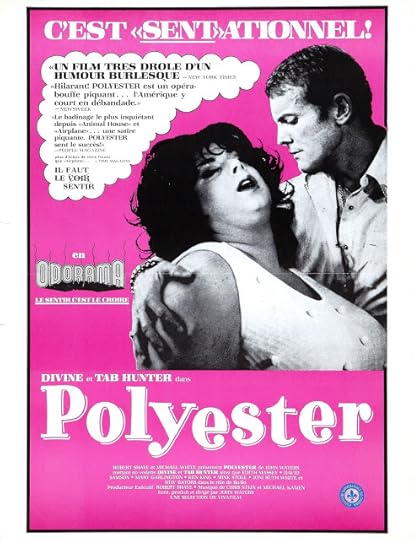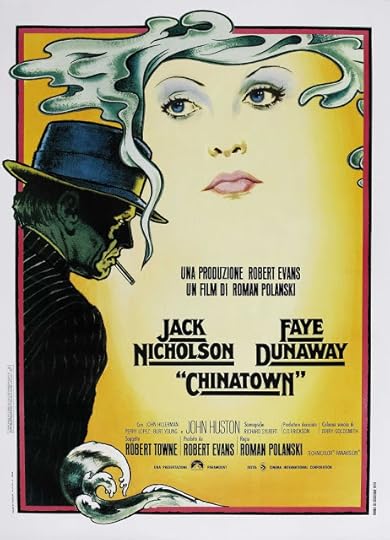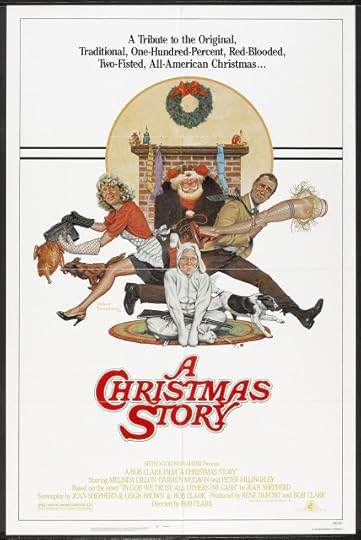Movies I Watched in December, Part 1
It's about halfway through January 2016, so I figured I might as well post what I saw in December 2015...

The last time I saw this movie also happened to be the first: Fall of 1985 during my freshman year of college, when Kent State showed it on campus, complete with Odorama cards and a question-and-answer session with director John Waters himself. The movie, which spoofs the 1950s melodramas of guys like Douglas Sirk (whom Waters, of course, is a huge fan of) has its moments, but these days it feels more like an interesting but awkward stepping stone between Waters’ early, outrageous (and usually X-rated) movies and the more mainstream fare that followed, like “Hairspray” (which I love – and wrote about here .) Focusing on the trials and tribulations of hapless Baltimore (of course) housewife Francine Fishpaw, “Polyester” is pretty uneven, mixing some solid jokes with long dead spaces and the sort of mean-spirited humor that worked better in movies like “Pink Flamingos,” when Waters and company could really go all out (and boy, did they ever). The best thing by far in “Polyester” is the central performance by Divine, channeling the spirit of late ‘60s Liz Taylor to deliver something that goes gloriously, outrageously over the top, back to the bottom again, then back over the top. It’s worth watching for Divine and Tab Hunter’s romance alone, which doesn’t seem quite so outlandish as it did back in 1981, when “Polyester” first hit screens.

We watched this one for our Out of Theaters podcast (listen to the episode here ), and though the discussion eventually turned to the life of director Roman Polanski, the movie itself generated plenty of interesting talk – and no wonder, it’s still one of the high points of 1970s cinema. Here’s part of what I wrote over at the Out of Theaters site – if you want to read more, visit the site itself...
More than 40 years after it hit screens, “Chinatown” remains fascinating because it’s a study in contrasts. It’s a prestigious, big budget picture that deals with the worst of humanity. It’s a picture postcard of 1930s Los Angeles that focuses on the corruption and lies that made the city possible. It’s a movie full of great actors where two of the most memorable performances are by directors (Polanski as a knife-wielding thug and the legendary John Huston as the monstrous Noah Cross.) And, on top of all that, it’s a movie where the dark events on the screen pale in comparison to the dark events that happened off the screen — before and after the movie was made.
Towne and Polanski disagreed over the ending of “Chinatown.” I won’t spoil it here, except to say that Towne wanted to end things on a somewhat dark note, and Polanski wanted to end things on an existentially bleak dark note. Polanski, who saw his parents killed in the Holocaust and his wife killed by the Manson Family, can be forgiven for having a dark view of humanity. Whether he can be forgiven for the notorious rape he committed in 1977, three years after “Chinatown,” is another matter entirely — and it’s not a matter we ignore on this episode of Out of Theaters. In what may be our darkest episode, we delve deeply into the mysteries of “Chinatown” and the man who directed it. We also ask the question “If an artist commits a horrible crime, can you still admire the art?”
And please, if you’re one of the people actually reading these monthly movie recaps, I urge you (hell, I beg you) to give the podcast a listen. We’re really proud of what we’re doing, combining actual film discussion with humor, trivia and contrasting opinions.

Somehow, amidst all the chaos of Christmas Eve, we managed to squeeze in a showing of this during its annual TBS maration. (Missing the first couple of minutes, I was able to catch those by sticking around after the end credits, thus obeying the anal-retentive rules I’ve established for myself on this movie list.) It’s fun, of course, really probably much better than it actually has to be. Any Christmas movie could’ve become an annual 24-hour tradition for some station looking to fill dead air, and we can be glad it was Bob Clark’s 1980 yuletide comedy and not some cinematic atrocity like, say, that “Grinch Who Stole Christmas Movie.” Clark’s movie, based on Jean Shepard’s short stories (and narrated by Shepard himself) is the perfect mix of warm nostalgia, goofy comedy and just the right touch of genuine sentiment. (My favorite example of the last is the glee Darrin McGavin has on his face watching his son open his Red Ryder BB Gun.) Once a year for “A Christmas Story” is enough, but I’m damned glad there’s an effortless (almost unavoidable) way to watch it that one time. Makes me wonder, though, in the right hands, could a similar story set in, say, the 1970s, be equally funny and charming? Time to fire up my copy of Final Draft and find out!

I wrote about it – a lot – right on this blog. Scroll down to the previous post when you’ve got a few hours to spare. Also, even though it's definitely not out of theaters (and probably won't be for a long, long time), we devoted an episode of the podcast to "The Force Awakens." Listen to it here .

The last time I saw this movie also happened to be the first: Fall of 1985 during my freshman year of college, when Kent State showed it on campus, complete with Odorama cards and a question-and-answer session with director John Waters himself. The movie, which spoofs the 1950s melodramas of guys like Douglas Sirk (whom Waters, of course, is a huge fan of) has its moments, but these days it feels more like an interesting but awkward stepping stone between Waters’ early, outrageous (and usually X-rated) movies and the more mainstream fare that followed, like “Hairspray” (which I love – and wrote about here .) Focusing on the trials and tribulations of hapless Baltimore (of course) housewife Francine Fishpaw, “Polyester” is pretty uneven, mixing some solid jokes with long dead spaces and the sort of mean-spirited humor that worked better in movies like “Pink Flamingos,” when Waters and company could really go all out (and boy, did they ever). The best thing by far in “Polyester” is the central performance by Divine, channeling the spirit of late ‘60s Liz Taylor to deliver something that goes gloriously, outrageously over the top, back to the bottom again, then back over the top. It’s worth watching for Divine and Tab Hunter’s romance alone, which doesn’t seem quite so outlandish as it did back in 1981, when “Polyester” first hit screens.

We watched this one for our Out of Theaters podcast (listen to the episode here ), and though the discussion eventually turned to the life of director Roman Polanski, the movie itself generated plenty of interesting talk – and no wonder, it’s still one of the high points of 1970s cinema. Here’s part of what I wrote over at the Out of Theaters site – if you want to read more, visit the site itself...
More than 40 years after it hit screens, “Chinatown” remains fascinating because it’s a study in contrasts. It’s a prestigious, big budget picture that deals with the worst of humanity. It’s a picture postcard of 1930s Los Angeles that focuses on the corruption and lies that made the city possible. It’s a movie full of great actors where two of the most memorable performances are by directors (Polanski as a knife-wielding thug and the legendary John Huston as the monstrous Noah Cross.) And, on top of all that, it’s a movie where the dark events on the screen pale in comparison to the dark events that happened off the screen — before and after the movie was made.
Towne and Polanski disagreed over the ending of “Chinatown.” I won’t spoil it here, except to say that Towne wanted to end things on a somewhat dark note, and Polanski wanted to end things on an existentially bleak dark note. Polanski, who saw his parents killed in the Holocaust and his wife killed by the Manson Family, can be forgiven for having a dark view of humanity. Whether he can be forgiven for the notorious rape he committed in 1977, three years after “Chinatown,” is another matter entirely — and it’s not a matter we ignore on this episode of Out of Theaters. In what may be our darkest episode, we delve deeply into the mysteries of “Chinatown” and the man who directed it. We also ask the question “If an artist commits a horrible crime, can you still admire the art?”
And please, if you’re one of the people actually reading these monthly movie recaps, I urge you (hell, I beg you) to give the podcast a listen. We’re really proud of what we’re doing, combining actual film discussion with humor, trivia and contrasting opinions.

Somehow, amidst all the chaos of Christmas Eve, we managed to squeeze in a showing of this during its annual TBS maration. (Missing the first couple of minutes, I was able to catch those by sticking around after the end credits, thus obeying the anal-retentive rules I’ve established for myself on this movie list.) It’s fun, of course, really probably much better than it actually has to be. Any Christmas movie could’ve become an annual 24-hour tradition for some station looking to fill dead air, and we can be glad it was Bob Clark’s 1980 yuletide comedy and not some cinematic atrocity like, say, that “Grinch Who Stole Christmas Movie.” Clark’s movie, based on Jean Shepard’s short stories (and narrated by Shepard himself) is the perfect mix of warm nostalgia, goofy comedy and just the right touch of genuine sentiment. (My favorite example of the last is the glee Darrin McGavin has on his face watching his son open his Red Ryder BB Gun.) Once a year for “A Christmas Story” is enough, but I’m damned glad there’s an effortless (almost unavoidable) way to watch it that one time. Makes me wonder, though, in the right hands, could a similar story set in, say, the 1970s, be equally funny and charming? Time to fire up my copy of Final Draft and find out!

I wrote about it – a lot – right on this blog. Scroll down to the previous post when you’ve got a few hours to spare. Also, even though it's definitely not out of theaters (and probably won't be for a long, long time), we devoted an episode of the podcast to "The Force Awakens." Listen to it here .
Published on January 13, 2016 17:37
No comments have been added yet.
Will Pfeifer's Blog
- Will Pfeifer's profile
- 23 followers
Will Pfeifer isn't a Goodreads Author
(yet),
but they
do have a blog,
so here are some recent posts imported from
their feed.



